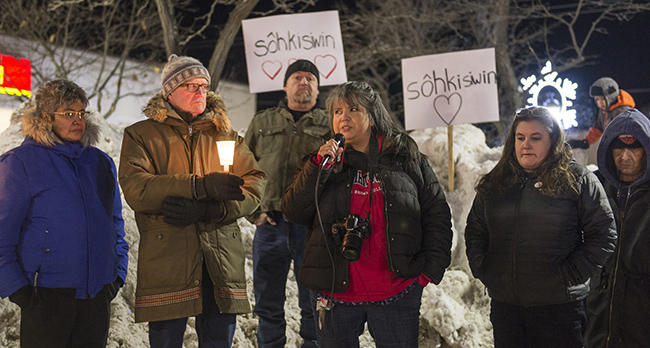The Stanley verdict: A shadow over reconciliation

By Catherine Murton Stoehr
NORTH BAY – More than 80 people held a vigil on Main Street in downtown North Bay Ontario on Saturday. Holding candles in the 15 below night their mood was somber. All had responded to an invitation posted on Facebook by Nipissing First Nation Chief Scott McLeod and artist and Nipissing First Nation member Aylan Couchie:
Please join us for a candlelight vigil to show our solidarity with the family of Colten Boushie and all Indigenous people who have been, and continue to be, treated unjustly by the systems Canada has put in place.
Three events led to this moment.
In August of 2016 Gerald Stanley, a Saskatchewan farmer, killed a young Red Pheasant First Nation man named Colten Boushie with a close range shot to the back of the head from a semi-automatic pistol.
In late January of 2018 Boushie’s cousin Jade Tootoosis reported that “every single visible Indigenous” person had been rejected as potential jurors for the Stanley trial by the defence lawyer Scott Spencer. “Its something we feared has come true” she said.
At the trial Stanley testified “As far as I was concerned [gun] was empty”; “the thing just went off” and “I didn’t pull the trigger.” Stanley does not deny that the gun was in his hand when it expelled the bullet that killed Mr. Boushie. Ms. Tootoosis’ words took on new meaning when the all-white jury set Gerald Stanley free with a “not guilty” verdict.
Aylan Couchie said that violence against First Nation people is constant, happening in real life “but also in comments section of newspapers and in op-eds written by Jonathan Kay in the National Post.” She put out a call to all non-indigenous people to do the work of ending that violence rather than leaving it to First Nations.
In a time of sharing Christine Cameron, a Sioux artist from Little Pine First Nation that neighbours Red Pheasant, connected Colten’s death to others, mentioning Neal Stonechild, a young man she knew personally when she lived in Saskatchewan.
17-year-old Stonechild froze to death in the Saskatoon snow in November of 1990. He was last seen in the backseat of a police cruiser. A subsequent inquiry found that the Saskatoon police attempted to cover up the incident.
Cameron said that neither of these young men is seen as human. It is this same dehumanization that led to her, along with some 20 000 other children, being put in the care of non-indigenous people who often disparaged their culture in the 60s scoop.
Despite striking a false note by likening discrimination suffered by Canadian immigrants to the colonial oppression of First Nations, Nipissing-Timiskaming Member of Parliament Anthony Rota offered the best and only words a government official could on such a night – he committed to personally bringing the community’s concerns to Justice Minister Jody Wilson-Raybault. The Anishinabek News will follow up with details on what he asks of her and the response.
Others offered songs and drumming including the Anishinabemowin “Unity Song” and a quiet chorus of “We shall overcome”.
The mixed crown included people coming from that day’s Canadore College Pow wow who were joined by many members of Nipissing First Nation and urban indigenous people from many other places. Folks who had gathered for an LGBTQ event at St. Andrews United walked over together and stood with staff from the Anishinabek Nation head office and many non-indigenous locals as well as a few professors from the university. Members of the North Bay labour community were in attendance and supported with logistical help.
According to Christine Cameron the verdict “casts a shadow over the hope that talk of reconciliation once brought.”
“What do we tell our sons and youth, how do we keep them alive in a world that holds such a low opinion of them?”


